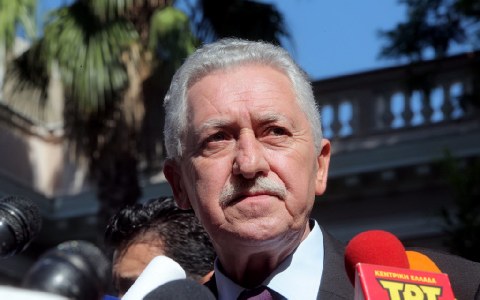Photos: Ethnos and To Vima
The unity of the tripartite coalition government in Greece has started to seriously shake. This Thursday, the leaders of the three governing parties should have agreed on the final package of measures that will be applied within the fiscal consolidation programme over the next two years. They, however, have not reached an agreement.
Upon leaving the latest meeting of the tripartite coalition, the leader of Democratic Left Fotis Kouvelis  said that nothing has yet been finally decided. He spoke very sharply about the creditors.
said that nothing has yet been finally decided. He spoke very sharply about the creditors.
Kouvelis insisted that the supervisory Troika of the International Monetary Fund, the European Central Bank and the European Commission should stop attacking Greek society. "It has a limit of resistance and the Troika must understand this," Kouvelis stated, apparently exasperated with the course of the negotiations. "The talks are continuing. Nothing has been finalized. He who hurried to say that the measures have been determined was wrong," he was adamant.
Just an hour before Kouvelis’ statement, Greek media leaked that the government and creditors have agreed on 20 key points that will save the budget around nine billion euro by the end of 2014. Among them are:
1. Complete elimination of the 13th and 14th salaries in the public sector and the relevant allowances for pensioners.
2. Increasing the retirement age from 65 to 67 years.
3. Applying the single payroll table (alignment of salaries) for all public organizations.
4. Reducing supplementary pensions.
5. Suspending the payment of compensation for retiring under 65 years of age.
6. Reducing the minimum pension for uninsured people in the third age.
7. Cutting social benefits.
8. Reducing social support for people with kidney disease.
9. Reducing the pensions of farmers and introducing health insurance for registered farmers of working age.
10. Extending the period of insurance, after which citizens can receive a minimum pension.
11. Cutting the social benefits for seasonal workers in the construction, tourism and other sectors.
12. Reviewing and consolidating the lists of needy people.
13. Reducing the number of public workers following the rule of appointing one person for every five retired and introducing a new form of labour reserve in the public administration.
14. Reducing drug costs for health insurance funds.
15. Limiting the costs of public health facilities.
16. Reducing the salaries of uniformed employees and medical staff in the public sector by 12%.
17. Establishing a direct connection between the tax concessions and the income and property of taxpayers.
18. Creating an effective mechanism for the revelation of undeclared income and assets.
19. Drastic penalties for tax violations found.
20. Creating a permanent service to observe tax revenues.
These are some of the measures that are believed to have already been agreed and that will be included in the final version of the new economic policy of Greece. Fotis Kouvelis seems to disagree with most of them, which makes it difficult to finalize the talks with creditors. They will decide on the payment of the tranche this autumn, which is starting to recede due to the government disagreement.
 Political analysts in Greece asses that Kouvelis’ Democratic Left is the weakest link in the tripartite coalition. If the creditors continue to call for cuts in wages and pensions, and layoffs in public administration, the party of Fotis Kouvelis will probably withdraw its support to the government and Greece will face a new political crisis. Meanwhile, PASOK continues to play the role of an arbiter in measuring the swords in the government. The statements of its leader Evangelos Venizelos have been more moderate. After the meeting at the prime minister's office, Venizelos said that PASOK would fight for a fair and balanced package. He emphasized that the delays could hurt the country and put it in a dangerous position.
Political analysts in Greece asses that Kouvelis’ Democratic Left is the weakest link in the tripartite coalition. If the creditors continue to call for cuts in wages and pensions, and layoffs in public administration, the party of Fotis Kouvelis will probably withdraw its support to the government and Greece will face a new political crisis. Meanwhile, PASOK continues to play the role of an arbiter in measuring the swords in the government. The statements of its leader Evangelos Venizelos have been more moderate. After the meeting at the prime minister's office, Venizelos said that PASOK would fight for a fair and balanced package. He emphasized that the delays could hurt the country and put it in a dangerous position.
Finance Minister Yiannis Stournaras’ role remains the most difficult. On the one hand, he is a technocrat who knows the urgent changes that need to be introduced for the recovery of the local economy. On the other, he must comply with the social and political attitudes within the country in order to carry out the reform. "There is agreement for a large part of the package, but it remains to clarify the other part of it. This means reforming the activity of the state," Stournaras said. The meaning of his speech shows that the cuts of public workers remain the problem of the government. Kouvelis definitely opposes layoffs in public administration, and this may be the small leak that will sink the ship of Greek rescue.